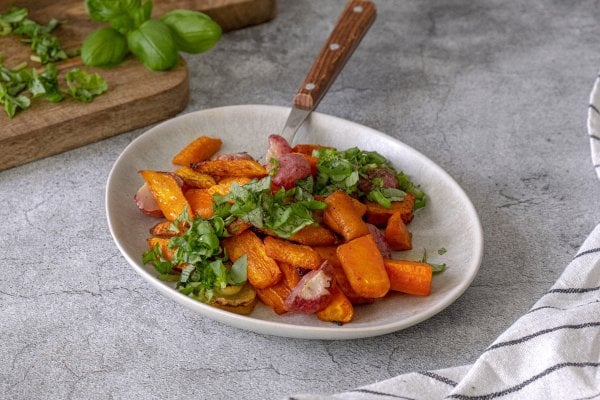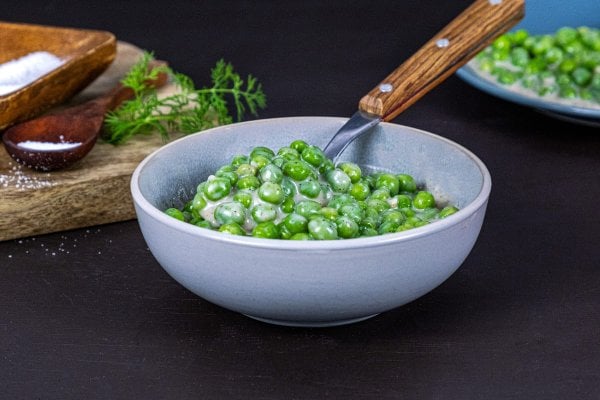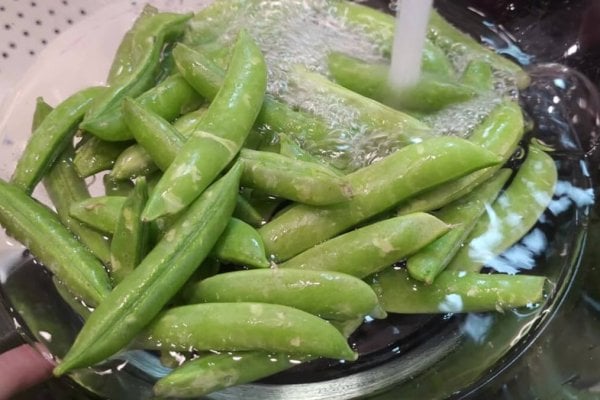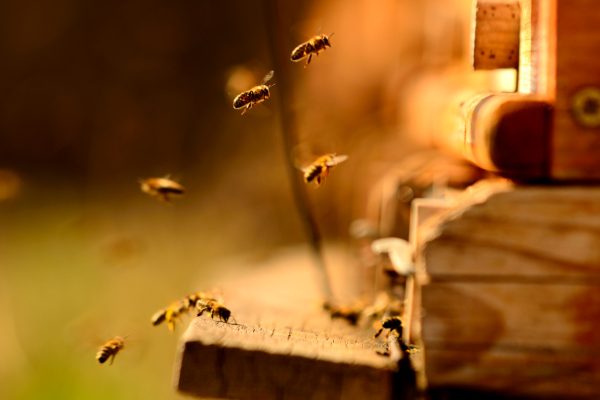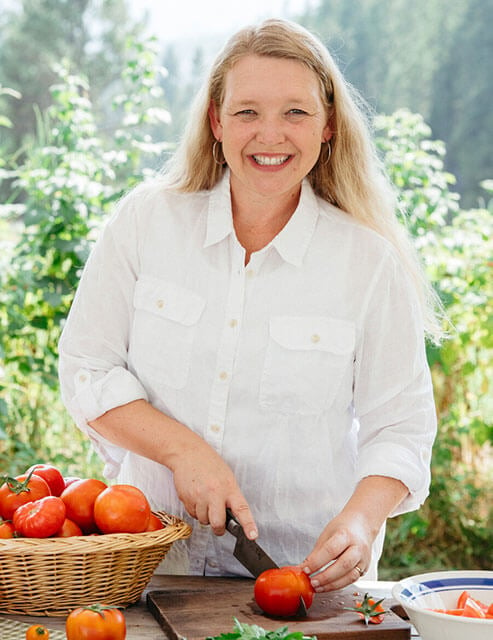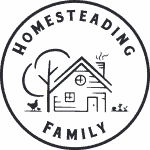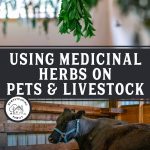
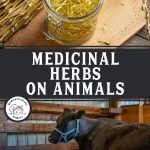
Learn from Doc Jones of Homegrown Herbalist how to incorporate herbal medicine with your animal care. Great for use on pets and livestock for a natural approach to animal husbandry.
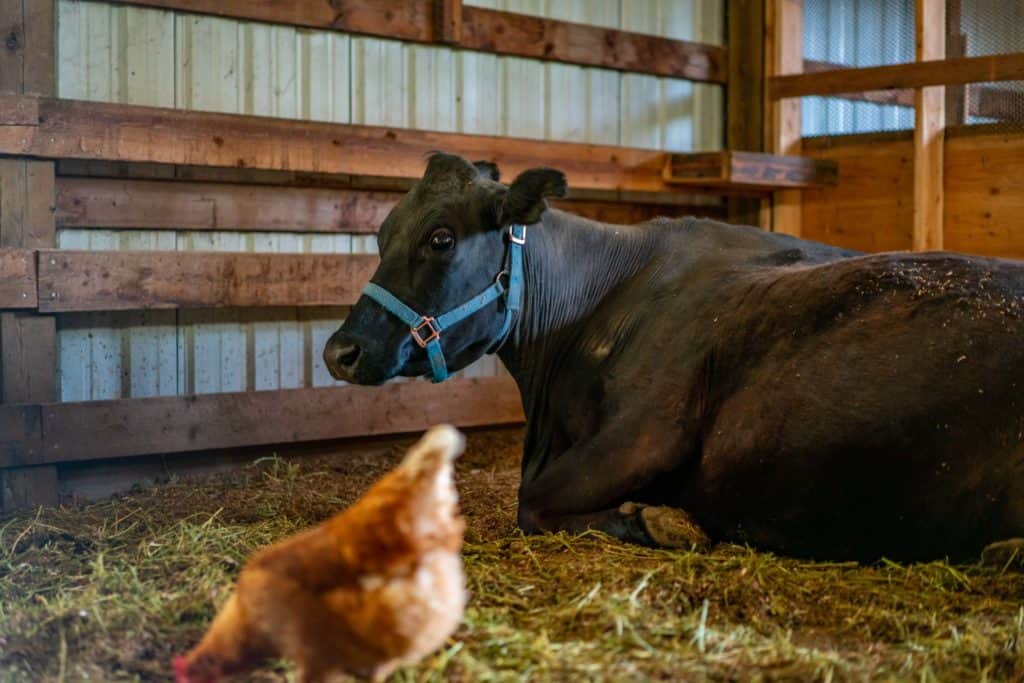
When our animals live healthy lives with clean water, clean barns and bedding, nutritious feed (like fermented grains), and proper mineralization, they will be much healthier overall. But if you’ve been homesteading with animals for any length of time, you probably know that issues will still come up that require medical attention.
This past year we lost two calves here at Riverbend, one was at birth, and the other was due to an uncaught case of scours. (Here’s more on what you can do in an emergency until help arrives.)
Though not all issues can be remedied by herbs, many issues can. Did you know that herbal remedies can even be used for common poultry diseases?
In this episode of the Pantry Chat, Doc Jones from HomeGrown Herbalist shares his 30+ years of veterinary herbal medicine with us. There’s not a lot of conversation happening around animal care and natural approaches to medical attention for your farm animals and pets, so we’re excited to have Doc Jones share his.
In This Episode:
- From an herbalist perspective, Doc Jones shares his approach when starting to care for animals holistically.
- Prevention is 90% of the battle regarding the health of your animals. Good animal care starts with good animal husbandry. Just like our own health starts with how we care for ourselves daily, the same goes for animals.
- Farms functioning on smaller scales have drastically fewer issues than those on a commercial scale.
- Veterinary herbal medicine and human herbal medicine are very similar. However, some herbs that you shouldn’t give to dogs are perfectly safe for humans. And this is usually due to the metabolic pathways and the liver.
- Doc Jones shares a good topical poultice formula.
- Where to Find Doc Jones (see below for links).
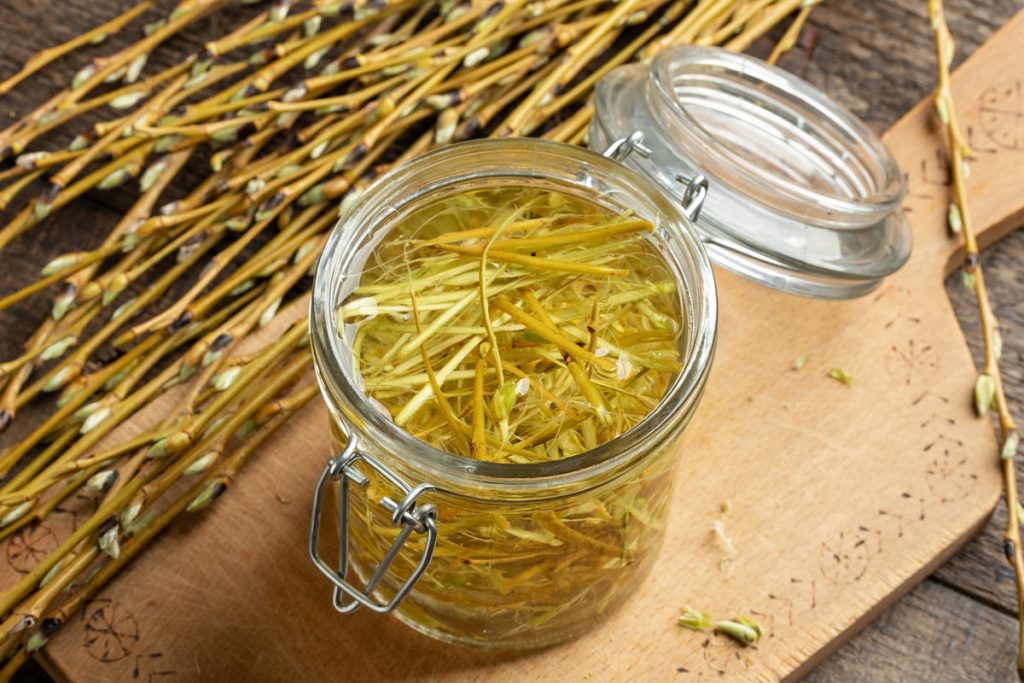
Topical Tincture for Wounds
A good topical tincture for wounds is made of yarrow for bleeding and antibiotic (Source), echinacea for infection (Source), plantain for pulling toxins (Source), and comfrey to accelerate healing (Source), with a pinch of cayenne to get things moving.
To make the topical tincture, use equal parts yarrow, echinacea, plantain, and comfrey with a small pinch of cayenne. Add this to strong alcohol (such as Everclear) and steep it for two weeks. Strain the herbs out and seal the tincture in a jar.
To make a topical spray, take a teaspoon of tincture and add it to 2-4 ounces of water. Use this on cuts, scrapes and rashes.
Homesteading Hack: It’s important to know that once the tincture is mixed with water, it’s only good for about 2-3 days, so only mix up what you’ll use within that time.
It’s important to note that I am not an accredited veterinarian. This post is not intended to diagnose or treat but is for informational purposes only. Please contact your animal care professional before introducing new herbal and natural remedies for your animals.
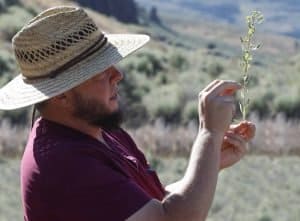
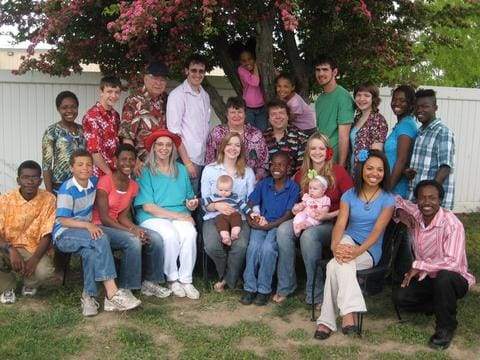
Where to Find Doc Jones
For more information on Doc Jones or the School of Botanical Medicine, visit the links below.
- HomeGrown Herbalist on Facebook
- HomeGrown Herbalist on YouTube
- HomeGrown Herbalist website
- HomeGrown Herbalist School of Botanical Medicine
- For questions, email info@homegrownherbalist.net
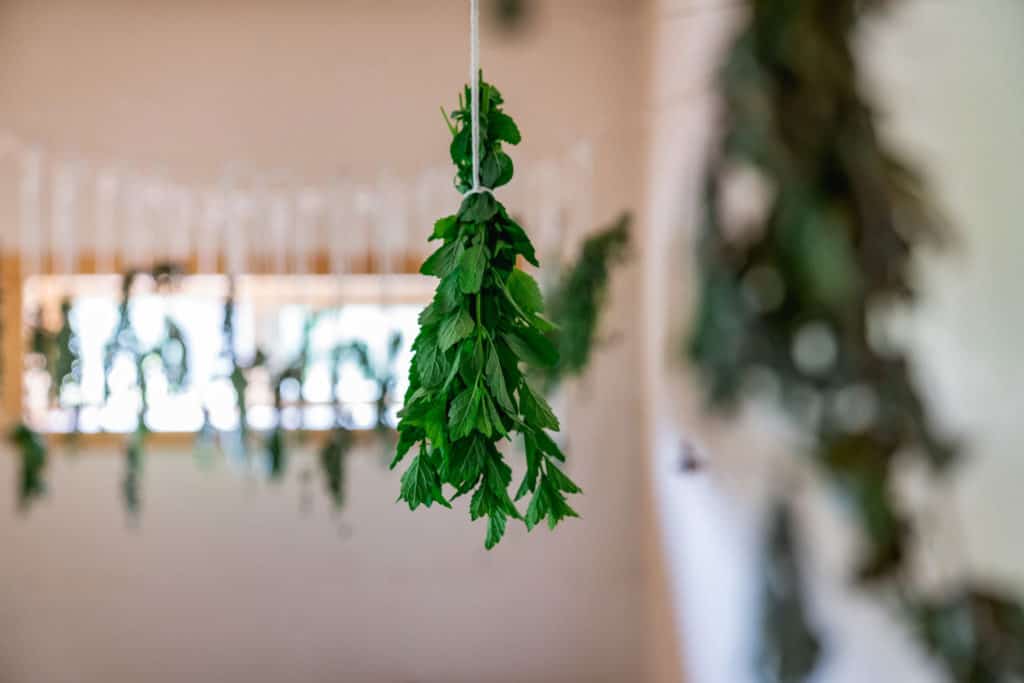
More Posts You May Enjoy
- How To Start Using Medicinal Herbs
- Building a Home Apothecary
- How to Use Herbal Medicine SAFELY at Home
- Medicinal Herbs & Their Uses
- 15 Medicinal Herbs To Grow, Harvest & How to Use Them
- Elecampane (Horse Heal) Benefits and Growing Guide
- How to Dry Fresh Herbs (Oven, Dehydrator, or Hanging)
Josh: Hey, you guys, this is Josh with Homesteading Family, and welcome to this episode of the Pantry Chat: Food for Thought. I'm really excited. Today I've got Dr. Patrick Jones visiting with us. For those of you that don't know him, he is a veterinary and an herbologist, is that the right way to say that?
Doc Jones: That's a way people say it and that works too. Herbologist or herbalist or yeah.
Josh: Yeah. And he just has some phenomenal experience with herbs, with animals, with people. So Patrick, just tell us a little bit for folks that maybe haven't been introduced to you, just about yourself, a little bit of a bio.
Doc Jones: So yeah, I'm Patrick Jones. I live down in southern Idaho about 12 hours south of here near Twin Falls. But I'm a veterinarian. I've been a practicing veterinarian for just over 30 years, and I've done everything, small animals, dairy cows, beef cows, hogs, poultry, just really literally everything. I'm also an herbalist. So a lot of what I do in the veterinary practice is with herbal medicine. I find that the herbs are sometimes vastly more useful tools than pharmaceuticals. I use pharmaceuticals too, but sometimes herbs can do things that drugs can't do. So we do that. I also am a naturopath. I went to naturopath school and so I had a human practice as well. But we have an online school of herbal medicine, the HomeGrown Herbalist School of Botanical Medicine. HomeGrownHerbalist.net is the site if anyone wants to look that up. But yeah, so we've just done a lot of things. Being a veterinarian has given me a lot of latitude as an herbalist to do whatever I want.
Josh: Yeah, to be able to really learn how to use those herbs in a context without worry about, I mean, some of the medical regulations or whatever. We'll get into that a little bit. And actually today we're going to talk a little bit about animal first aid and herbology on the farm and some ways to naturally treat your animals. But first we usually catch up with everybody that, Carolyn and I do with what's going on with us behind the scenes and on the farm. So besides being up here, which he came up and graciously taught a class last night to the homeschool group on herbal first aid, and we've been filming some other projects here. But besides that, what have you been up to? What's your day-to-day look like, and what's interesting and going on the last couple weeks?
Doc Jones: As far as the herb company, we're doing a lot of harvesting, and we're all up to our ears in that right now. We grow a lot of our own stuff.
Josh: Let me just back up a little bit, because besides treating people in a practice, you sell tinctures and herbs, and I think this is really cool. You're growing a lot of this. So I mean, I know you probably have to bring some in, but a lot of it, you actually are growing yourself that you're providing to people.
Doc Jones: Yeah, we are. And we're growing as much of it as we can on our own.
Josh: That's cool.
Doc Jones: It's a vastly different product. I mean, it's just, if you harvested stuff from here and dried it, a year from now it would be twice as aromatic as anything you bought online. It's just a different product.
Josh: Like our food, for those of us that raise a lot of our food, I mean, yeah, we're wanting health and some food security, but the experience and the quality and the flavor and what's there is just, it doesn't compare it to anything you can get in the store.
Doc Jones: Yep. It's the same exact issue as food, industrial commercial food production. The same thing's happening with the herb industry. They've got a field of peppermint or whatever it is, and they're harvesting it with a combine, and it's getting dried in a big commercial dryer. It's just sadly a little similar to what's happening to our food supply.
Josh: And who knows how old it is. You mentioned this last night, by the time it gets into that capsule, into the bottle, onto the store shelf, into you, it's what, probably a couple years old a lot of times.
Doc Jones: Yeah. I was talking to a gentleman few months ago, who's a commercial grower for an herb company. He says, "None of my stuff is in a package for a year."
Josh: Wow. Yeah.
Doc Jones: So it's too bad. And they're doing their best. I mean, they're doing what they can do.
Josh: Sure, yeah. It's the system.
Doc Jones: I don't mean to pick on them. And there's huge need and huge demand and what do you do? But it's just a very different. We had dinner with you guys last night and was as good a salad and better vegetables than I've had anywhere, commercial or restaurant.
Josh: Well, I mean, what you're saying is just another piece to me in the thought of creating more regional food systems and even in this case, herb systems, because you can grow it and get it to people in a shorter amount of time and it's more effective, it's more powerful. That really just argues that we need more people doing what you're doing, not just the homesteading but growing the herbs, so that there's a better product out there, not just this mass commercially produced product.
Doc Jones: Yeah. It makes a big difference. One of the things we emphasize in the school is helping people realize it's not that hard to grow herbs, and they could be producing a lot of medicine on their own property very easily. Carolyn's got this adorable cottage garden here that's not very big.
Josh: It's not very big, it's not very old.
Doc Jones: But it would produce a ton of medicine. You've got really all the bases covered. We went through it the other day. I didn't see anything in there that I was saying, "Oh, holy cow, she sure better get some of this or she'll be in trouble someday." She's got all the bases covered.
Josh: Yeah. She's got it well covered, and that's less than a thousand square feet and it's got medicinals in it, it's got culinaries in it, it's got cut alls in it, so it's not all even going to medicinals. And then you guys, this was, if you haven't seen the video a few years ago, this was lawn. This was like what we're sitting on. And literally in one year, this. I mean, it's much more robust now after a couple years of maturing, but it only took one season. I mean, literally in May, we covered the ground and did a no-till layered system, kind of Paul Gouchy style. And she had all her starts and planted them, and in the first year, this cottage garden was thriving. So you can go that fast.
Doc Jones: Yeah. They're amazing plants.
Josh: Get yourself into your own herbs.
Doc Jones: Yeah. On our property down in, we just sold it actually when I bought another property that we're at a bigger property. But it was just a home on, we probably had a half acre of yard and garden space that we were using, and we had 150 species of medicinals and were producing tons of stuff.
Josh: You see that? On a half acre. See what you guys could do? I mean, 150 species.
Doc Jones: The other thing that you can do is all of your landscaping can be medicinal, the trees, the bushes, the flowers. Most of the plants that you're friends with already are medicinal.
Josh: Well, see this garden back here, you see the hollyhocks, and there's always flowers in here. Most of them are medicinal, but there's always something beautiful. So it can be a beautiful landscape while being extremely useful. And you can even sprinkle in maybe some of those things that aren't medicinal, but that you want in there just to spice it up. Yeah. Cool. So you're harvesting a lot right now.
Doc Jones: Yeah, yeah. Just that time of year. Of course I'm doing a lot of writing. I'm writing a couple of books. I have two books already. One's just called The HomeGrown Herbalist. The other's The HomeGrown Herbalist's Guide to Medicinal Weeds. But I'm doing one on trees. I'm doing one on spices, the medicinal value. It's called Kitchen Medicine.
Josh: Oh, love it.
Doc Jones: Everything in your spice store is fabulous medicine.
Josh: If I can get it through just eating food, I mean, I'm just a foodie. I love my food. Our whole world revolves around our food. So if I can just get my medicine that way on top of nutrient dense food, I'm in. I'm sold.
Doc Jones: And it tastes good. That's right.
Josh: Yeah. Wow. Very cool. Well, so let's talk about the farm. A lot of folks that are listening and watching are somewhere in their journey of homesteading and generally have animals involved in their systems, anywhere from chickens on up to dairy cow, beef cows. It's something that we really don't have a conversation a lot about is just animal care and animal medicine from a holistic homesteading perspective. We're trying to be good stewards of land, good stewards of our animals. I know for us, one of the reasons we don't have that conversation a lot is because of the way we do things.
Having learned from folks like Joel Salatin, where we prevent a lot of problems, we just don't have them if you're doing things well. However, we do have problems occasionally, and as you know, people do. And we have found, and this year we lost two calves, we've had a few chicken problems, and we find ourselves highly unprepared for that. So I think this is an exciting discussion. So I'm not even really sure where to jump off, to where to even begin to talk about approaching. How do you just start to think about, from an herbalist perspective treating animals and thinking about putting together maybe a plan or a system or a method to incorporate something into your homestead?
Doc Jones: Well, so the first thing, what you said was extraordinarily important that if you're providing the animals with what they're designed to experience in life, as far as housing and feed and everything, they're going to have vastly fewer problems. If all the humans would watch a Joel Salatin video and say, "Hey, why don't I eat like I'm supposed to?" we'd have a lot fewer problems too. But that's really the thing. As prevention is 90% of the battle for most things.
I've been a veterinarian in lots of different parts of the country. I was in Minnesota for several years. I was on the Oregon coast in Tillamook for several years. I've been in southern Idaho now for 25 years. But the small farms in Minnesota and even the small farms on the Oregon coast had vastly fewer problems with their dairy cows and their pigs and everything else than the big commercial dairies that I've worked with in southern Idaho. A guy in Minnesota might have 50 cows. I don't know anymore if they do. But 30 years ago they did. He had 50 cows and he knew them all by name.
Josh: It's a different level of care.
Doc Jones: It was a different level of care versus the guy in southern Idaho that has 5,000 cows. The cows in Minnesota were living 20 years and milking their brains out for 20 years. The ones in these big commercial herds, if they go five years, you feel pretty lucky.
Josh: Well, here you go again, promoting that more regional, smaller type system of food production. But I mean, it works.
Doc Jones: It works.
Josh: Those guys are profitable too. Those guys are making a good living.
Doc Jones: Yeah, they're profitable. Yeah.
Josh: You don't have to be gigantic.
Doc Jones: When that 20-year-old cow goes to heaven, she doesn't owe that guy anything. She's paid for herself many, many times.
Josh: She put in her time. Yeah. Yeah. So okay, so it just starts with good basic animal husbandry.
Doc Jones: It really does. It really does.
Josh: That's a starting place. And just like our own care, our own health starts with taking care of ourselves, eating good food and good quality of life. So we're providing them with good food, a good quality of life. So from there though, we do have problems. We do, we run into injuries, we do run into disease occasionally.
Doc Jones: The thing that I have been preaching for my whole career, and nobody seems to believe me, is that veterinary herbal medicine and human herbal medicine are almost identical. Veterinary herbal medicine is actually, might be older than human herbal medicine.
Josh: Really?
Doc Jones: There's Chinese manuscripts from some of the oldest written manuscripts that we have from India and China are talking about veterinary medicine.
Josh: Wow. Well, yeah, the animals where everything, their livelihood.
Doc Jones: Yeah. It's one thing if your kid dies, that's very sad. But if your cow dies, everybody dies.
Josh: Right, yeah. And literally true. That's a hard thing for us to relate to today, but really it's only a couple hundred years, not even that, that animals haven't been absolutely essential to everybody.
Doc Jones: Yeah, absolutely. So there's a very, very, very long history of herbal medicine and traditional Chinese medicine and Ayurvedic medicine from India that goes back many thousands of years. But the fact is that there are a few minor differences. There's a few herbs that you probably shouldn't give your dog because sometimes, and it's usually the liver that's the culprit, but sometimes the metabolic pathways in the liver of one species are very different than the liver in another species. If you give this guy over here grapes, it might kill him because he turns it into something weird and it melts his kidneys.
Josh: I got to ask, and this is a little bit of a tangent, but chocolate.
Doc Jones: Chocolate.
Josh: For dogs.
Doc Jones: Chocolate-
Josh: Is it as bad as people say it is?
Doc Jones: Well, no. It's exactly as bad as it is for humans. Chocolate's got a chemical in it called theobromine, which is very similar to caffeine. It's a mild stimulant. The problem with a dog is that if you have a six-pound Yorkie and he gets a Hershey bar-
Josh: A whole bar, right, yeah.
Doc Jones: ... that's very different than your 12-year-old kid eating the whole bar. It's just a dosage issue. It's not more toxic or more dangerous for them.
Josh: Well, people, I mean, I've seen people just get really worried about that. I mean, it's not we're going around giving our dogs chocolate. We have better uses for it. But I've always sensed that, no, I think that's got to be a little bit out there.
Doc Jones: It is. And honestly, there's not enough real chocolate in any of our chocolate anymore anyway. I mean a Hershey bar, I don't know how much real chocolate's even in a Hershey bar. Not that there's anything wrong with Hershey bars. If they're watching, we love Hershey bars. But the real chocolate, the real, there's not a lot of it in any of the chocolates we're eating in North America anyway. They still eat a lot of it in Europe because they like it stronger. But yeah, no, it's just a dosing issue.
Josh: Okay. So anyways, that was a little side tangent. But that's immediately what I thought of with the dogs. Like, oh, I wonder. He'll know. So you were talking about grapes with the dogs and treating the dogs herbally.
Doc Jones: Yeah. So basically, just as an example, when I created my formulas for HomeGrown Herbalist, there's probably 80 formulas or something that we have that we're producing regularly. When I created those formulas, I created them so that they could be used in a dog or a chicken or a goat or a cow or a human and it wouldn't matter. As I look back on those formulas now, if I was doing it just for humans, they wouldn't be any different. If I was doing it just for dogs, they wouldn't be any ... You know what I mean? I mean, there's so much similarity. It's just almost the same thing. But we've had just a lot of success over the years, taking care of dogs and cats and cows and everything else with herbs. It's basically the same sorts of things that you would have for your family. Maybe a little higher on the wound management end, especially if you have horses because they're prone to doing dumb things and getting hurt.
Josh: Yeah. They're real good at getting bad wounds.
Doc Jones: Yeah. So basically when I treat a horse wound or a cow or whatever it is, they get tangled up in the barbed wire, they run into something and get a big gash, there are some herbs for wound management particularly that are phenomenally better than anything pharmaceutical.
Josh: These are some of the same that are for human, I mean Yarrow.
Doc Jones: Yeah, exactly the same. Yep. Yarrow to stop the bleeding, calendula for the infection, yarrow for the infection too for that matter, and then comfrey to heal it up faster. If you had those three plants for a wound, and the way I do it, I used to poultice everything, and I would take the plant material, either fresh plant material or dried powder mixed with a little water and I'd poultice it and wrap it. I just don't do that at all anymore hardly. Nowadays I'm doing everything with a wound spray. So basically what I'm doing is I'm making a tincture out of my poultice formula, so it's an alcohol extract of the poultice formula, and I'm spraying that on the wound and they're healing up just as fast.
Josh: So let's, we can walk through-
Doc Jones: And it's way less work.
Josh: Oh, yeah. Well, way less work, but you've also got it on your counter ready to exactly go, which is very powerful argument. It's very nice to have everything fresh out here for sure. And if you're there, you can grab it and go. But there's only so much of the year that everything is like this, ready to go. So that tincture is always going to be ready. So for dressing a general wound for any animal, a dog, a cow, a sheep, you've got, say, just some sort of laceration that's not, you don't need a vet, a surgical, mechanical type process, but you just need to dress the wound. So can you go back to just the basic, what's a basic couple herbs you could have, make a tincture out of, have ready and then just approach tackling that wound?
Doc Jones: Okay. So if I had a wound case, which I've had a zillion of wound cases, and if you want to see some cool wound cases, go to HomeGrownHerbalist.net.
Josh: Oh. Yeah, go see his website.
Doc Jones: And go to the blog. There's a lot of blog articles about wound cases, animal and human that we've done. Honestly in my experience, I don't care how big the wound or how bad the wound is. If you got the right herbs, you can heal it up. Just as one example, we had a dog, a little Alaskan Eskimo that got run over. She's an old dog and not very fast and couldn't see and couldn't hear. Dad didn't see her when he was backing out of the driveway and she didn't see him.
Josh: Yep, well, man.
Doc Jones: Anyway, got run over. And because of the crushing trauma to the tissue, she sloughed all of the skin on her back. I mean, she had a wound that big. And there's no way to close that surgically even if you wanted to. All we did with that dog was herbs. She also had multiple pelvic fractures and all we did was herbs.
Josh: So three, you were talking about three common herbs that somebody could make a tincture of.
Doc Jones: So what I would do, so what I did with her topically, when I have a wound case, I address it topically and I also address it internally. So we're going to attack that from both sides. So topically, we were using my poultice formula, but it's the same usual suspects in any poultice formula. That formula has some yarrow in it for bleeding and for antibiotic. It has a little echinacea in it for infection. And it has some plantain for pulling toxins and junk out of it. And it's got a lot of comfrey in it to accelerate healing. There's a little pinch of cayenne in there to wake things up and get them moving.
Josh: There's four basic herbs that you can grow. I mean, you can grow them on the side of your house on a small spot-
Doc Jones: Easy.
Josh: ... to make a tincture.
Doc Jones: Yeah. Comfrey, calendula, yarrow, plantain, and pinch a cayenne for fun. And topically, I was doing that several times a day. Then internally I'm going to use very similar, probably the same herbs. I might add a few more things for immune stimulation. I might add a little more echinacea, but some olive leaf, some other immune stimulating guys. But honestly those same four herbs internally would do the same job for you. We have a tendency as humans and in general and as herbalists in particular to over-complicate formulas sometimes.
Josh: Yeah, you were talking last night. I mean, you made it sound pretty simple that a lot of times, for something basic like this, you can just take your jar you make a tincture in, and kind of just do equal parts. You said on this one the comfrey maybe is a little higher ratio, and then fill that with your tincture, which would be a vodka or something, and let that set for a couple weeks.
Doc Jones: Yeah. That's really all there is to it.
Josh: And strain it off and you've got your tincture.
Doc Jones: If I'm going to spray a tincture on an open wound, then I'm probably going to dilute it with a little water so it's not too zingy. Because alcohol is pretty exciting. So what I do is I take a teaspoon of that tincture and I'll put it in two to four ounces of water. So I get a little four-ounce spray bottle and I put, fill it halfway with water, which is a couple ounces and then throw a teaspoon of tincture in. Then once it's mixed with the water, the shelf life of that tincture is about the same as a tea. So it's only good for two or three days. So you don't want to mix a gallon.
Josh: Once it's in the water. It's very shelf stable before you put it in the water.
Doc Jones: Yeah. No, it'll last 30 years in the tincture form.
Josh: So you're going to take that, so you're mixing it enough to use for that wound over a few days, as you're going to probably treat it every day.
Doc Jones: Yeah. Then I'll mix up some more. Yeah.
Josh: So just to put that to work for somebody, and what I'm trying to get to is maybe just somebody's got a little bit of a visual path here. So dealing with a wound, they're going to stop the bleeding, of course, basic wound care. Going to rinse it, wash it.
Doc Jones: Right. And you can rinse it with a tea of those same herbs.
Josh: Yeah. Okay. Yeah, if you've got-
Doc Jones: That's a wonderful antiseptic, or just some calendula tea.
Josh: So then apply topically your tincture and then wrap.
Doc Jones: Not necessarily.
Josh: Not necessarily.
Doc Jones: I don't usually wrap stuff. That would only depend on if it was outdoors and it was fly season, I might wrap some.
Josh: I guess that would be on the homestead, I'm thinking dust, I'm thinking flies. They're still going to have to be out there in their environment, so I don't know.
Doc Jones: Yeah. And just like I say, it just depends completely on how clean it is. But there was a historical footnote that the British had much higher mortality rates with their officers than they did with their enlisted men in the Navy because the officers were getting taken down below and wrapped up and the enlisted guys were laying up on the deck with their wounds open.
Josh: Oh, getting air, getting sunshine.
Doc Jones: So a little air and sunshine's a good thing.
Josh: Yes. We all need oxygen and vitamin D.
Doc Jones: So anyway, but yeah, if it's a real dirty environment, certainly a bandage is a great idea. But for dog cases, I've never had them wrap a dog wound. Just spray it. And the more often you do it, the better it works, the faster it works.
Josh: Yeah. So multiple times a day, the first few days?
Doc Jones: Yeah. Yeah. Whenever you think about it, grab that stuff and spray it.
Josh: And your bigger animals on the homestead probably twice a day you're going to-
Doc Jones: Exactly.
Josh: It's hard to do it more than twice a day.
Doc Jones: No, twice a day is great.
Josh: Process might be a little slower, but that's going to work, right? Yeah.
Doc Jones: Yep. But it's also safer for the homesteader to be doing a spray than to be doing a poultice and a bandaging and all that other stuff. If you're standing under that horse of that cow messing with a wound that's a little tender, just blasting it from two feet away is easier and safer.
Josh: Yeah. Well, and that's really nice. You can even get a sprayer bottle that shoots a little more of a stream if you need to, if you have an animal that's difficult-
Doc Jones: Yeah, you got a groucher.
Josh: ... that's not handleable, you can still get that in there. And if you've got them at least secured where they can't get far. Man, that's exciting. That's just so easy.
Doc Jones: It really is easy.
Josh: I mean, we're just talking about one aspect. We obviously can't cover a whole realm of things. But just thinking about wound care, which you can grow right here and be ready to treat your animals, that's going to heal up quickly. And then in a lot of those cases, would you give them the same herbs internally?
Doc Jones: Yeah, I would.
Josh: Have some dried, have them dried and encapsulated.
Doc Jones: Yep. Just throw them on their feed.
Josh: Throw them on their feed. Okay.
Doc Jones: Animals are easy to give herbs to. In the small animal practice, unless they're cats. That's a whole another discussion.
Josh: Yeah. I'm not trying to give a cat a pill. I'd rather ruffle with my bull than a ruffled cat.
Doc Jones: But with dogs, yeah, with dogs, I just put powdered herbs, mix it with a little wet food and they'll almost always eat them. Once in a while you get a little Pomeranian or something that says, "I don't think that's food." Give him a tincture. Here, you think that's food? But otherwise put it on their food and they're fine. But with livestock, I mean they think that's candy. Goats will chase you around for more. They're terrible to try and get away from. But yeah, just put it ... The other interesting thing that's an important note is that the dose for a human of a dry powdered herb is about a teaspoon typically for most of them. But for a 2,000-pound horse, it's a couple of tablespoons. So how come it's not way more than that, right? I mean, you'd think it would be a half a pound based on weight. So you have to start to say, "Well, why is that?" I think the reason it is, is because horses are still eating what they're supposed to eat and the herbs have less to overcome.
Josh: Oh, okay. All right.
Doc Jones: That's my hypothesis anyway. But it really is true. You can treat a horse or an adult cow with a couple of big rounded tablespoons full of herbs, and it'll be just as effective as a-
Josh: Oh, man, yeah. Put it in a little alfalfa or a little bit of grain.
Doc Jones: You don't have to give them a half a pound of it.
Josh: We don't get a lot of grain, but that's a good moment to just make it easy to take in and ingest. Wow. Well, there are-
Doc Jones: Certainly if they're not eating, you just mix that powdered herb with some water and drench them with it. That's easy too. If you got a little calf with scours that's really in bad shape and isn't eating or something, you can do that.
Josh: We actually lost a calf to scours and this season and really busy, didn't catch it. By the time we did, it was too late. But is there a good herb for scours?
Doc Jones: Oh, absolutely. The best herb in the world for shutting scours down is angelica seed.
Josh: Angelica seed.
Doc Jones: Angelica is super easy to grow. It's a cousin of your lovage that you've got back here. Looks just like it. Big, tall guy. But you just let the seed dry on the heads and then harvest it, and just feed them the seed. But it's the best thing in the world for diarrhea and dysentery. Sage is also very good. Just garden sage like you stuff your turkey with is really, really good for diarrhea and dysentery. And the sage has some antimicrobial properties to help with it too. Of course. I'm going to also load them up with some echinacea and some other, maybe some Oregon grape or something, calendula, some things to kill some bugs. But mainly you got to shut the diarrhea down because they're going to mostly what they die of is dehydration.
Josh: Dehydration. Yeah. Okay. Wow. Well, I'm learning a lot just right here, and this is an area we need to learn a lot more about, and it was really exciting to hear your perspective on this. So we're about out of time. We got to wrap up. How can people engage you to learn more and maybe learn from you how to build a plan. And maybe even you also sell some tinctures, so that's a great way to get started too is to get those on hand, if you're not in this place to grow them or you just want to have something ready to go while you're maybe learning the DIY side of it. Yeah. What-
Doc Jones: So we have two websites. HomeGrownHerbalist.net is our primary website. That has all of our formulas. Then I just about six months ago started another little website called herbpet.com for dog formulas basically. But either of those sites will have all of our formulas. And just shoot us an email, and if you don't know what to do, or you can do a search on the website too, and it'll pull things up, but just send an email to info@homegrownherbalist.net if you have a specific question. I'm happy to help.
Josh: Awesome.
Doc Jones: We also do, there's blog articles on the website. I have a YouTube channel, HomeGrown Herbalist where we talk about stuff.
Josh: So look him up there. You also teach classes, both I think in webinars and live?
Doc Jones: Yeah.
Josh: I mean, you came here and taught a class, so I'm assuming you're willing to go somewhere to teach seminars.
Doc Jones: Yep. We do live events. Yeah, we do lots of live seminars and plant walks and things. And of course we have the school. One of the really unique things about the school is because I was a veterinarian all those years, we talk about all that stuff in the school.
Josh: It's amazing to me, we're taught that everything's so complicated and we need to leave it to all of the professionals. And there are certainly places and times for that, where you were talking about the mechanics of doctors and things they do that are very, very good. But there's also so much simplicity and things that we can handle right here at home very easily with just a little bit of knowledge and a little bit of effort. That's really, really exciting and something I've not even thought of whole lot of in this world. So we're going to dive into that a little bit. I hope you guys will too. Mr. Jones, thanks for joining me today.
Doc Jones: Happy to be here. It was great.
Josh: Hopefully some of you guys will reach out and learn a little bit more. And it's been great to hang out with all of you and we'll see you soon. Goodbye.
Sign up to receive email updates
Enter your name and email address below and I'll send you periodic updates about the podcast.











